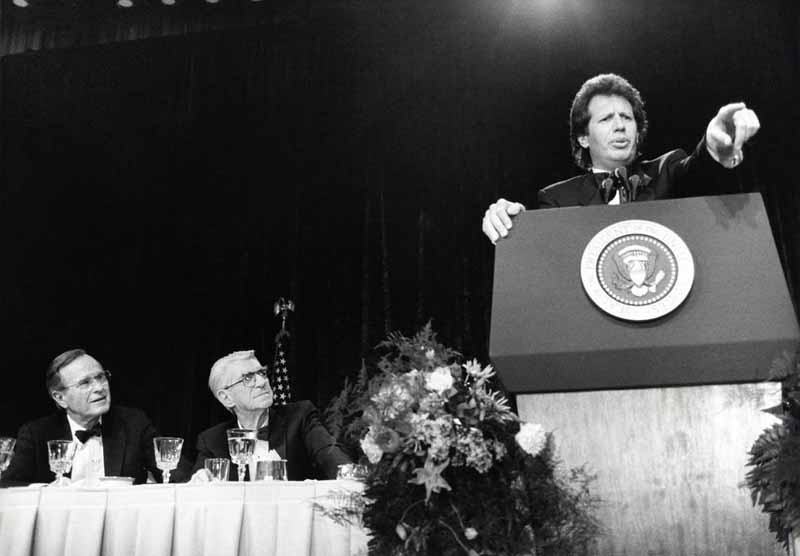Judd Apatow’s cinematic eulogy to his mentor

There’s no question that Judd Apatow occupies quite the creative catbird seat in Hollywood. He’s not only directed (The 40-Year-Old Virgin, Trainwreck) and produced (Superbad, Bridesmaids, The Big Sick) his fair share of blockbuster films, but he’s made his mark on network (Freaks and Geeks, The Ben Stiller Show) and pay cable (Girls, Crashing). That said, nothing strikes as close to home as his forthcoming documentary The Zen Diaries of Garry Shandling, a four-and-a-half-hour, two-part documentary set to air on HBO.
This project goes beyond being a mere film about the late comedic genius. Its subject was also Apatow’s close friend and a longtime mentor who not only gave him his first major break writing and directing on Shandling’s storied series The Larry Sanders Show, but continues to influence the Syosset native to this day. Having shot conversations with more than 40 of the comic’s friends and family, Apatow fleshed out the story with intimate footage (much of which came from the director’s own archives) and excerpts from Shandling’s personal journals dating back to the late 1970s. The seeds for this project were planted during the memorial service, (parts of which are in the film), which Apatow was asked to help out with.
“When he died, the estate asked me if I wanted to put together the memorial service,” Apatow explained. “So I lined up some speakers and a few musicians played. Then I put together a few short documentaries on Garry on a few different subjects and different eras. As I was doing it, I realized that I could turn it into a whole documentary. So I spent about a year just looking for, and at, footage and then another almost a year, editing with our editor, Joe Beshenkovsky (Montage of Heck, Jane), who is a real genius.”
The end result is a chronological trip through Shandling’s life, starting off with his family in Chicago, before his parents Irving Shandling and Muriel Estelle (née Singer) along with older brother Barry moved to Arizona so the latter could receive treatment for cystic fibrosis. The death of his sibling when Shandling was 10 had a devastating effect on him, but was little known to even the closest of friends. Apatow masterfully traces his late friend’s evolution as a comedic force and mirrors how self-reflective Shandling was throughout his life, particularly once Eastern philosophy and Buddhism became a central part of his core belief system. And while Apatow was initially uncomfortable immersing himself in the film so soon after his friend’s death, he found it helped with the grieving process.
“In the beginning, it was hard to listen to Garry speak so much and to review all the tapes. But then, I got used to it and really started to enjoy being with him, laughing with him and discovering new parts to his life that I didn’t know anything about. In a weird way, I feel like I became better friends with him by learning so much,” he explained. “The most important thing that I learned was that Garry spent a lifetime using Eastern spirituality and Buddhism to help him get through things. He used the journals as a way of talking to himself. A lot of it is him connecting to a higher voice and giving himself advice. And usually the advice was about Buddhist ideas, such as non-attachment, letting go of your ego, kindness and he used those concepts in his comedy as well. Later in his life, in his journals he wrote about being a mentor. I thought he was just a nice man who was available to people if they needed advice. And it was a very conscious choice to be a more giving person and I found that to be very powerful.”

For the viewer, Zen Diaries offers insight into the complexity beyond Shandling’s greatness as a comic and more importantly, as a person. Apatow shares Shandling’s triumphs (going from writing for Sanford and Son to creating a pair of storied shows) to struggles both professional (suing his former manager Brad Grey) and personal (a bout with a hyper-parathyroid glandular problem later in life). It all ends up being a very immersive experience that reflects how Apatow felt about his dear friend.
“Garry was a very unique individual—a comedy genius and a spiritual seeker. He was a very devoted friend, who had his own unique way of looking at the world. But ultimately, what he cared most about was exploring how and why people treat each other the way they do and the obstacles to connection and love,” he said. “That’s what he did in his work and that’s what he was attempting to do with his life. And not that he got all the way there, it was just that he was trying to get there. He was a neurotic man and human like everybody else. He struggled and suffered and he was always trying to learn how to be a better person.”


















